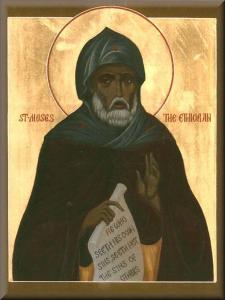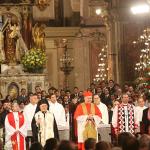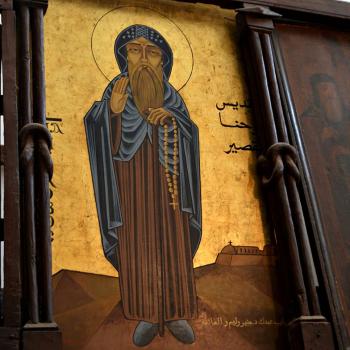
St. Moses the Ethiopian early on learned that no one was completely outside of God’s love and providence; that is, he found out that anyone, and so, everyone, could be saved. But he also understood the kind of transformation people needed for their salvation could be and would be difficult, perhaps taking all of one’s temporal life, if not beyond – but no matter how difficult it is, such transformation is possible, and we should do what we can to help each other as we work out our own salvation. Thus, it is said, he gave precepts which he thought, if people followed them, would assure them of their salvation, whether they were a monk, a hermit, or someone living in the world:
Abba Moses gave the following seven precepts to Abba Poemen which, if observed, will lead to salvation for anybody, whether in a coenobion or in solitude or in the world itself:
- In the first place, as it is written a man must love God with all your heart and with all your mind.
- A man must love his neighbour as himself.
- A man must do to death all evil in him.
- A man must not judge his brother in any dispute.
- A man must do no evil to another person.
- Before departing this life, a man must cleanse himself of every fault of mind or body.
- A man must always be of a humble and contrite heart.
This can be achieved by anyone who thinks of his own sins all the time and not of his neighbour’s, with the assistance of the grace of our Lord Jesus Christ who with the Father and the Holy Spirit lives and reign world without end. Amen.[1]
Moses thought that the most important thing for us to do is to constantly examine ourselves, to find out how we need to change our lives, and to do what we can that will promote such reform. Nonetheless, he was also clear, we could not do it without God’s grace. We cannot do everything all by ourselves. But, he also understood, we can’t just leave it up to God and do nothing ourselves. We must embrace the way of love, and act upon it, for that way, we will then love God and our neighbor, and that love will open us up to God and God’s grace. Such love, he said, would prevent us from needlessly judging or condemning others. That is because if we focus on others, and what we think they have done wrong, the less we will be focusing on ourselves and what we need to do. If we are not concerned about our own faults, we will find ourselves in a perilous situation as we will not seek to attain the purity of heart we need to see God and experience the fullness of the kingdom of God for ourselves.
Moses knew the truth of these precepts from his own life. Those who showed him love and care, those who welcomed him into the monastic community despite his past (that of an escaped slave who became a highway brigand), helped him find the path to salvation. If he had been condemned and rejected, instead of embraced with love, would he have found the path of salvation, let alone become such a greatly loved saint? This is why harsh judgments and condemnations of our neighbor are not helpful, as they tend to turn people away from God and God’s ways, both the one being condemned, but also the one making the condemnation. For, those who are being harshly judged tend to resist those who treat them poorly, doubling down on those actions for which they are being condemned, while those who make such judgments, by making them, abandon the way of love, and so also find themselves far off from God.
Moses, therefore, reiterated, in a way, what Christ said: we are to love God, and in doing so, find ourselves loving our neighbors, that is, everyone else. If we truly love God, we will seek God, removing all the barriers which we have put between us and God. That is, we will seek to purify our hearts, eliminating all the evil that lies within us. We will do what we can, not only to do no evil to others, but out of love for God, and for our neighbor, to do what we can to truly help them. The more we love God and others in this fashion, the greater our own personal spiritual condition will be, and we will find ourselves, as a result, growing in virtue. But, as Moses also warned us, we must always make sure our spiritual transformation and development coincides with humility, a humility which does not make us prideful or vainglorious, but also a humility which also allows us to love ourselves, so as not fall for false pride and hate ourselves for failing to do what we think we should be able to do.
Moses lived these precepts himself, and saw the value in them. Once he had converted to the Christian faith, and became a monk, he took his own sins seriously, but he also took seriously the need to show his neighbor his love. He never wanted to judge or condemn anyone. He spoke of the need to embrace forgiveness, reminding those who would judge others that the judgment they make will come back upon them, for they have their own sins following after them. When we judge others, we justify doing them evil, and when we justify doing them evil, we justify evil and the way of evil, the way of unlove, the way which leads to destruction. We don’t have to follow that path. No one does. And that is why Moses said anyone, no matter their background, can be saved.
[1] More Sayings of the Desert Fathers. An English Translation And Notes. Ed. John Wortley (Cambridge: Cambridge University Press, 2019; repr. 2023), 65 [“Sayings Preserved in Latin”: L94].
Stay in touch! Like A Little Bit of Nothing on Facebook.
If you liked what you read, please consider sharing it with your friends and family!
N.B.: While I read comments to moderate them, I rarely respond to them. If I don’t respond to your comment directly, don’t assume I am unthankful for it. I appreciate it. But I want readers to feel free to ask questions, and hopefully, dialogue with each other. I have shared what I wanted to say, though some responses will get a brief reply by me, or, if I find it interesting and something I can engage fully, as the foundation for another post. I have had many posts inspired or improved upon thanks to my readers.













